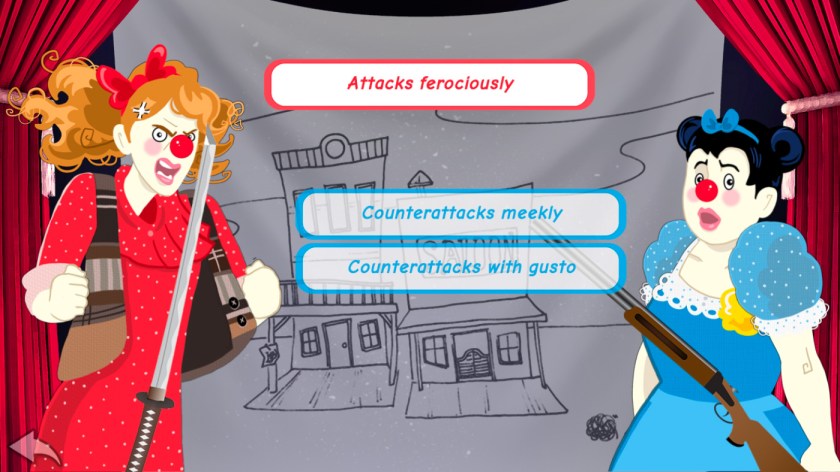IF Comp intents to enter are now open, so if you’d like to write for the comp this year, you can sign up.
The next London IF meetup is coming soon, July 19, and will focus on writing IF for money — or hiring those who do.
August 14-17, Cape Cod, MA is the Foundation of Digital Games conference, including a workshop in procedural content generation. The PCG workshop has a theme this year:
What do our generators say about the underlying systems we have designed and the designers who create them? Our theme aims to explore the biases inherent in PCG and the potential with which to subvert it.
Articles and Research
This week James Ryan’s Twitter feed has been a treasure trove of interesting links and images: he’s researching the history of procedurally generated text and has found a wealth of material going back decades.
*
Sergei Mozhaisky has translated a couple of my articles into Russian. As I don’t read Russian at all, I can’t comment on the details, but they can be found here:
- Plot-Shaped Level Design (original) (translation)
- Set, Check, or Gate (original) (translation)
*
Lyle Skains has a presentation on how readers respond to different types of links in hypertext narratives, which is likely relevant to Twine; though one of the things that struck me about the example is that it wasn’t immediately easy to see (as a reader) which types of links were which. I found myself wondering how much the effects observed in this study were due to the absence of conventions around hyperlink labelling in the literary hypertext community, as opposed to using different colors and a clear schema to distinguish between links that explore and links that move forward as in some of Porpentine’s work. Also worth looking at in this regard: Alice Maz’ Colorado Red, which distinguishes forward-moving links from tooltips for showing the narrator’s feelings about things in the text.
*
Gillian Smith et al have published a report from the ICCC’s workshop on social justice and computational creativity, which looks at questions from implicit bias in machine learning to AI-assisted ways of interpreting the world around us to questions of access in related academic and technical fields. Her own paper for the workshop outlines some subjects for further thought in this area, including ethical deployment of machine learning in situations where the general public may not be aware they’re seeing the artifacts of AI. (And if you’re interested in this, see also Liza Daly’s essay Ethical Imperatives in AI and Generated Art.)
*
ZedKraze reviews Will O’Neill’s Little Red Lie. The game is not a new release, but I only ran across it recently.
Edit: I think I got the wrong end of the stick about the release date on this, possibly. Sorry about that! It seems like perhaps it is in fact reasonably new.
*
IF Comp Prize Fund, and retrospectives
One of the new features of IF Comp this year is a cash prize fund. It’s still possible to donate other prizes, including books, games, toys, food, services in kind, and probably even (if you really want) separate prizes of money; but the intent of the fund is to make sure there are financial rewards distributed a bit more evenly than in the past and to more places.
Meanwhile, Chris Klimas has written an article looking back at the first ever edition of IF Comp, and Craig Locke is covering some games of IF Comp past as well.
AdventureX
AdventureX 2017 is currently on Kickstarter, raising funds to run November 11-12. It’s a two-day conference and demo floor that focuses on narrative games, including graphical adventures and various forms of IF. Last year I spoke; this year features a bunch of cool people including Jon Ingold. If you would like to speak or present, you can also find a presenter application here.
New Toys and Games

New on iOS is Silent Streets, which describes itself as “an augmented reality detective adventure,” with choose your own adventure elements, but also the opportunity to find important clues in your real-world environment, and unlock new events by walking using your GPS tracker. The game also provides voice acting, and writing from Richard Cobbett (of games journalism and Fallen London/Sunless Seas fame). About the design, Cobbett writes:
The nature of the game made for an interesting structural challenge, due to having to carefully balance the player’s likely mental bandwidth as they dipped in and out of the story, coming up with mysteries that allowed for lots of movement and interesting reveals that didn’t waste their valuable time, while still keeping the interactive element of being the one to solve the cases and complete bonus challenges to discover more than just the raw solution. Contacts for instance both allow the player to ask about the various things they’ve found, and act as touchpoints led by representatives of the different factions – the press, the police, the underworld.
Of things previously mentioned on this blog, this is probably closest to Jim Munroe’s Wonderland, which also features puzzles unlocked by walking. (And for the same reasons, I may not get around to playing, let alone finishing, this any time soon: while I walk around a fair amount, it’s often in contexts where I need a bit too much attention for my immediate surroundings to be immersed in a game. But your experience may be different, especially if your main walking context is not rush-hour London.) And of course there’s the well-established Zombies, Run!
Engadget also has a write-up of the experience.
*
StoryNexus and quality-based narrative fans who recall Rob Sherman’s highly creepy Black Crown Project may be interested in this message from the author:
[The Black Crown Project has] been offline for over two years now, but last year the copyright reverted to me from Random House… I’ve compiled all of the material I have (including the game assets, notes, sketches and prototypes) and placed it into a Github repository for anybody, anywhere to do anything they like with, as long as they don’t try and commercialise it.
The archive is found here: https://github.com/bonfiredog/blackcrownproject
*

Morro and Jasp is a two-player conversation game where both players are selecting what to say next (so none of the conversation responses are selected by the system). Or, as they put it:
Morro & Jasp: Unscripted is a 2 player conversation/performance simulator, where (practically) every line is chosen by a player. There are 28k words of dialogue (and about 100 different endings) for playthroughs that last only a few minutes — the idea is that every session is radically different. It’s also a collaboration with theatre artists (the titular clowns), so there are really unique influences in the writing of it (including clown theory!)
The concept distantly reminds me of Dietrich Squinkifer’s masterpiece of awkwardness, Coffee: A Misunderstanding. This doesn’t have the players actually speak the lines that they’ve chosen, though, and presumably the effect is rather different. I am curious about clown theory, too.
*
17776 Football is not exactly traditional IF, at least as far as I’ve played; it’s closer to dynamic fiction, with embedded images and video to help tell its story, and a few link-based elements.
*
Caleb Wilson’s excellent and influential Lime Ergot now has a Spanish translation, thanks to Ruber Eaglenest.
*
Wikitext: The Text Adventure is a parser style text adventure space that allows you to traverse locations defined by Wikipedia. I was able to make it start in Oxford and then wander the described space until I got to the street I live on, which was surreal. I doubt this works for every street — Oxford locations are probably a bit over-represented in Wikipedia — but still, a good time.

Ili is a narrative game now being kickstarted, mostly focusing on dialogue and negotiation rather than combat. The demo only works on Windows, so I haven’t had a chance to give it a shot, but the author writes:
Ili is an immortal being haunted by regret. Your aim is to guide Ili through her past and meet the ghosts from her past. While Ili is the game’s protagonist, you control most of her actions and act more like her spiritual guide. You are to help her say or do things that she would be too afraid to do by herself. The problems put in front of both you and Ili can be solved in different ways through talking. Do you intend to change the past? Or is it better to make peace with the past and to move on?
Ultimate Ending Books is a CYOA line I hadn’t heard of until just recently; don’t really know more about them than the website.
 If you’re interested in procedural toys, you’ve probably already seen Inspirobot. If not, enjoy. I think it’s saying that I could live in a volcano if I had a couple cocktails first.
If you’re interested in procedural toys, you’ve probably already seen Inspirobot. If not, enjoy. I think it’s saying that I could live in a volcano if I had a couple cocktails first.
oh! also Polar Jam came to an end and now we have three new very cool (literally) for pass the summer:
https://itch.io/jam/polar
Also this Spanish jam organised by me, you know, that thing about doing games about songs about “the desert, the storm and the sea” (tales of the frontier) gave us 6 games (in Spanish) three IF stuff, one platformer and two board games.
https://itch.io/jam/canciones-del-desierto-la-tormenta-y-el-mar